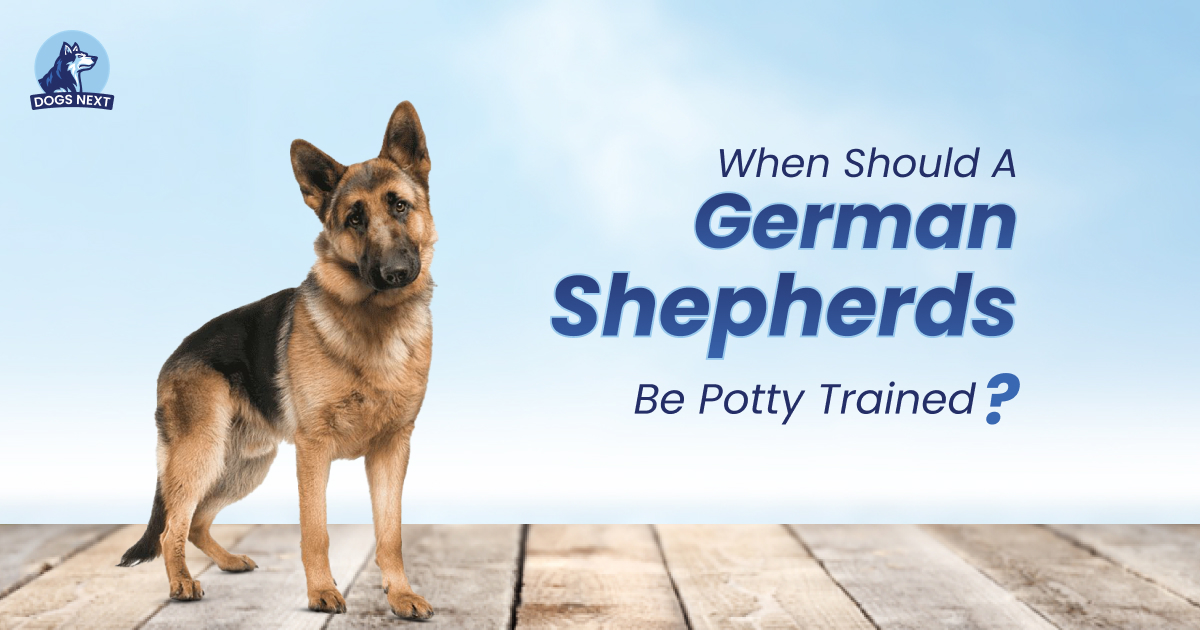If you’ve recently brought home a German Shepherd puppy, one of the first things you’ll need to tackle is potty training. Knowing when to begin this process can be challenging, but it’s essential for establishing good habits and preventing accidents. So, when should a German Shepherd be potty trained?
While every puppy is different, most German Shepherds can begin potty training around 12-16 weeks of age. However, it’s essential to pay attention to your puppy’s individual development and readiness before starting.
In this article, we’ll provide you with some tips for successful housebreaking, including how to determine if your puppy is ready to begin potty training, what techniques to use, and how to handle setbacks.
Understanding Your German Shepherd’s Development
When it comes to potty training your German Shepherd puppy, understanding their development is key. Puppies develop at different rates, so it’s essential to pay attention to your individual puppy’s needs and abilities.
General timeline of a German Shepherd puppy’s development
German Shepherd puppies typically begin their development in the womb, and their physical and behavioral changes continue for the first two years of their life. Here’s a general timeline of a German Shepherd puppy’s development:
Birth to 2 weeks: The puppy’s eyes and ears are closed, and they rely on touch and smell to navigate the world.
2 to 4 weeks: The puppy’s eyes and ears begin to open, and they start to stand and walk.
4 to 12 weeks: The puppy’s senses and motor skills improve, and they become more social with other dogs and humans.
12 to 16 weeks: The puppy’s adult teeth come in, and they begin to lose their baby teeth. This is also the typical age range for potty training to begin.
4 to 6 months: The puppy’s growth rate slows down, and they become more independent.
6 to 12 months: The puppy’s adult coat begins to come in, and they may experience a second fear period.
1 to 2 years: The puppy is now fully mature and has reached their adult size and weight.
When Puppies Develop Bowel and Bladder Control
Potty training is all about teaching your puppy to control their bowel and bladder movements. Most puppies begin to develop bowel and bladder control around 12 to 16 weeks of age. However, this can vary depending on the individual puppy’s development and physical health.
Factors That Can Affect the Timeline of Potty Training
Several factors can affect the timeline of potty training for German Shepherd puppies. These include:
Breed: Some breeds are easier to potty train than others due to their size, temperament, and physical abilities.
Size: Smaller puppies generally have smaller bladders and may need more frequent potty breaks.
Health: Puppies with health issues may have difficulty controlling their bladder and bowel movements.
Training techniques: The methods you use to potty train your puppy can affect how quickly they learn and develop good habits.
By understanding your German Shepherd puppy’s development and taking these factors into account, you can set them up for success in their potty-training journey.
How to Determine if Your German Shepherd is Ready for Potty Training
Potty training your German Shepherd is a crucial step in their development and bonding with you as their owner. However, it’s important to make sure your puppy is ready for potty training before starting the process. Here are some ways to determine if your German Shepherd is ready for potty training:
Look for physical signs of readiness
One way to tell if your German Shepherd puppy is ready for potty training is to look for physical signs of readiness. These signs include:
- Being able to hold their bladder for at least two hours during the day
- Having regular bowel movements that are easy to predict
- Showing an interest in going outside to potty
- Sniffing around and circling before going potty
- Waking up dry from naps or in the morning
Observe their behavior
Another way to determine if your German Shepherd is ready for potty training is to observe their behavior. Look for signs that they are aware of their body’s signals and are trying to communicate their need to go potty, such as:
- Whining or barking to go outside
- Scratching or pawing at the door
- Sitting or standing by the door or in front of you
- Looking restless or uncomfortable
Consider their age and development
While every puppy develops at their own pace, most German Shepherd puppies are ready for potty training between 12 to 16 weeks of age. At this age, they are physically and mentally able to control their bladder and bowel movements for short periods.
However, some puppies may take longer or may be ready earlier, so it’s important to pay attention to your individual puppy’s development and needs.
How to Potty Train Your German Shepherd Puppy
Here are some tips for successful potty training:
Establish a routine
Establishing a routine for your puppy is crucial for successful potty training. Take your puppy outside to potty at the same times every day, such as after meals, naps, and playtime. This will help your puppy learn when to expect to go outside and make it easier for them to hold their bladder and bowel movements.
Use positive reinforcement
Positive reinforcement is a key technique in potty training your German Shepherd puppy. When your puppy goes potty outside, praise them and give them a treat or toy to reinforce good behavior. This will help them associate going potty outside with positive experiences, and encourage them to continue the behavior.
Supervise your puppy
Supervising your puppy during the potty-training process is important to prevent accidents and reinforce good behavior. Keep your puppy in a designated area when you can’t supervise them, such as a crate or playpen, and keep them on a leash when outside. This will help you keep an eye on your puppy’s behavior and ensure they go potty outside.
Handle setbacks and accidents
Setbacks and accidents are a normal part of the potty-training process, so it’s important to handle them calmly and consistently. When your puppy has an accident inside, clean it up thoroughly and avoid punishing or scolding them. Instead, focus on reinforcing good behavior and continue with the potty-training routine.
Remember, every puppy learns at their own pace, so be patient and consistent in your approach. With time and effort, your puppy will learn to go potty outside and develop a strong bond with you as their owner.
Frequently Asked Questions
Q: Are German Shepherds hard to potty train?
Ans: German Shepherds can be challenging to potty train due to their strong will and high energy levels, but with patience, consistency, and positive reinforcement, it is possible to successfully train them.
Q: How do I stop my German Shepherd from peeing in the house?
Ans: The best way to stop your German Shepherd from peeing in the house is to establish a consistent routine, supervise your dog, use positive reinforcement, and limit their access to areas where they are prone to accidents. You can also consider crate training or using pee pads for additional support.
Q: How often do German Shepherds need to pee?
Ans: German Shepherds, like other dogs, need to pee several times a day, depending on their age, size, and activity level. On average, they may need to go out every 2-4 hours, but this can vary based on individual factors.
Q: At what age can a German Shepherd hold its bladder?
Ans: German Shepherd puppies can typically only hold their bladder for a few hours at a time, and it may take several months for them to develop full bladder control. By around six months of age, most German Shepherds should be able to hold their bladder for longer periods.
Conclusion
In conclusion, potty training your German Shepherd puppy is an essential part of their development and requires patience, consistency, and positive reinforcement. Understanding your puppy’s development, determining when they are ready for potty training, and using effective techniques are all important steps in the process.
Remember to establish a routine, use positive reinforcement, supervise your puppy, and handle setbacks and accidents calmly. With time and effort, you can successfully potty train your German Shepherd and enjoy a strong bond with your furry companion. And, if you’re wondering when should a German Shepherd be potty trained, the answer is simple: start the process as soon as your puppy is ready, and be consistent and patient in your approach.

I’m David, an expert contributor and writer, with two furry friends of my own, I know the challenges of raising and caring for dogs. From training to nutrition and health, my goal is to provide valuable insights and advice to help create strong bonds and happy, healthy lives. Find me in Twitter.




